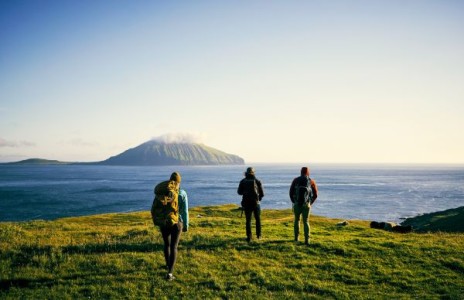
The Danish archipelago has come up with a solution to the problem of mass tourism: closing access to visitors and only welcoming volunteers who take part in projects to preserve the environment. Image: pixdeluxe/IStock.com via AFP Relaxnews
The Danish archipelago has come up with a solution to the problem of mass tourism: closing access to visitors and only welcoming volunteers who take part in projects to preserve the environment. The initiative, which is set to last for two days, will take place on April 16 and 17, 2020.
Located between Iceland and northern Scotland, the Faroe Islands have yet to fall victim to mass tourism. However, the Faroese are well aware of the charms of their green and snowy landscapes. The tourist office of the Danish autonomous region reports that 111,000 people traveled to the archipelago last year, and the numbers of tourists visiting some of the Islands’ attractions have risen by 10% in recent years.
To tackle the consequences of a steep increase in tourism, the Faroese have decided to encourage visitors to roll up their sleeves and help set up structures that preserve the attractions of the islands.
In 2019, only volunteers were allowed to travel to the archipelago over a period of two days when it was officially “closed for maintenance, [and] open for volontourism.” One hundred people from 25 countries took part in the project, which consisted of marking out hiking trails in the busiest locations and setting up observatories for the most popular views.
In the wake of the success of this initiative, the islands are set to close for maintenance a second time on April 16 and 17, 2020. Volunteers will not have to pay for food, accommodation or transport, but they will have to pay for return flights from their countries of origin. Virgin Atlantic is offering a special fare of €223 from Copenhagen on April 15. The volunteers will participate in 14 projects located all over the archipelago.
If you would like to join in, you have to register in advance at www.visitfaroeislands.com. If you do not want to take part, you can still travel to the Faroe Islands some other time, only not on April 16 and 17 of next year. IB/JB
RELATED STORIES:
Metro Manila is worst place to drive in (again), says Waze
Philippines among countries most threatened by rising seas, says new study
Condé Nast Traveler reveals results of 2019 Readers’ Choice Awards